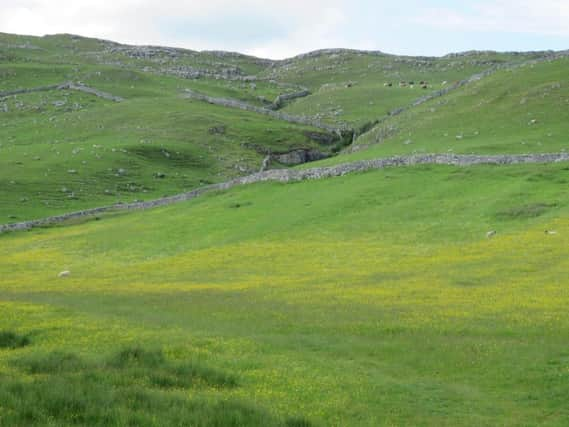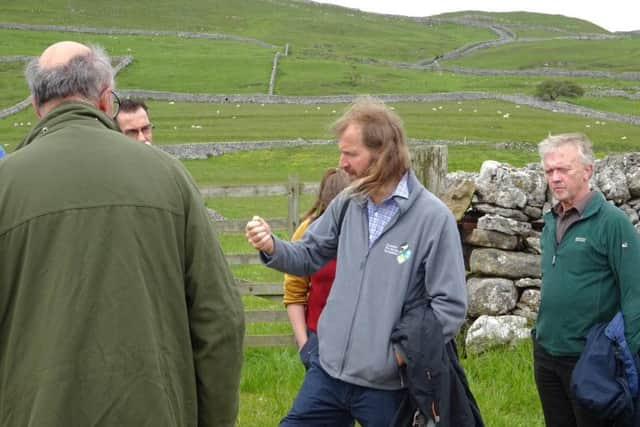Championing the Farmed Environment plans to rebuild momentum lost by problematic Countryside Stewardship


Advertisement
Hide AdAdvertisement
Hide Ad

The previously named Campaign for the Farmed Environment was relaunched in the North of England this week at Hill Top Farm in Malham under its new title, Championing the Farmed Environment, and those behind the initiative hope it can help remedy a malaise caused by the current Countryside Stewardship Scheme.
The scheme, previously administered in accordance with the pan-European Common Agricultural Policy by Natural England and now by the Rural Payments Agency, provides financial incentives for farmers and land managers to look after their environment.
However, the scheme’s well-documented rigid prescriptions, the bureaucratic nature of applications and a poor track record of paying farmers to deliver the schemes has meant many who had engaged through earlier schemes are becoming disenfranchised from embracing the environmental agenda, said Fraser Hugill, the CFE’s northern area co-ordinator.
Advertisement
Hide AdAdvertisement
Hide AdYet, with government proposals to replace direct farm support payments with new payments linked to the delivery of environmental “public goods”, as well as Whitehall ambitions to achieve a net-zero economy by 2050, the whole of the farming industry needs to work in even greater harmony with the natural world.
Group will help bridge gap
Mr Hugill, who farms 350 acres at Sproxton, near Helmsley, and spoke to more than 30 farming and environmental representatives at the CFE relaunch event this week, said: “In the current climate, CFE is more relevant than ever. It can play a role in bridging the gap between the current schemes and helping to get people ready for what is to come.”
Addressing the need for a group like CFE, he said: “The consensus at the launch event seemed to be that farmers and environmental organisations are equally disappointed with how we are going about delivering environmental schemes and there is a real desire for change right up and down the food chain.
“There is a feeling that farmers are becoming turned off because of ‘schemes’ generating a general negativity around ‘the environment’ but I would say that managing for the wider environment is much more than just a scheme. I think there is a challenge to re-engage farmers with the environment be it through schemes or through simple day-to-day farm management practices.
Advertisement
Hide AdAdvertisement
Hide Ad“CFE champions putting the environment alongside food production because the environment should be a big part of a farm business, and there are strong economic or social reasons for taking environmental action that are nothing to do with current agri-environment schemes,” he said.
Productivity and environment can go hand-in-hand
The CFE encourages farmers to consider how best to farm whilst nurturing wildlife, air quality, soils and water. By doing so, farm businesses can improve their productivity in the long term, Mr Hugill said.
“We are seeing farmers really embrace the challenge of improving soil health, driven by the desire to improve farm productivity but also generating wider public benefits through reduced run-off and lower levels of emissions.”
He said small changes can have an impact, citing as an example how Hill Top Farm’s Neil Heseltine – who spoke at the CFE relaunch event – has thistles manually removed from his land, saving money on sprays, reducing his environmental impact and generating local employment.
Advertisement
Hide AdAdvertisement
Hide AdMr Heseltine is also benefitting from reducing cattle and sheep numbers and switching to a lower input system, boosting the diversity of wildlife and plants on his farm.
Momentum challenge
Farmers are inherently engaged by a sense of duty to the natural world but many need support and encouragement to capitalise on those sentiments, Mr Hugill said.
“A lot of them have an interest. I only have to look at the turnout at previous CFE barn owl events for example, which have been very well attended over the years. But there is so much more farmers can do quite easily and we shouldn’t shy away from that challenge. We can’t afford for another five years until another environmental scheme comes out to build momentum up again.”
The relaunched CFE operates nationally. Its new name reflects how it champions good environmental work farmers already do. Its role is to be “a mechanism to support and provide recognition to farmers who are farming in an environmentally responsible way” and to act as a hub for those who want to do more, promoting best practice by working with partners.
For more details, see cfeonline.org.uk